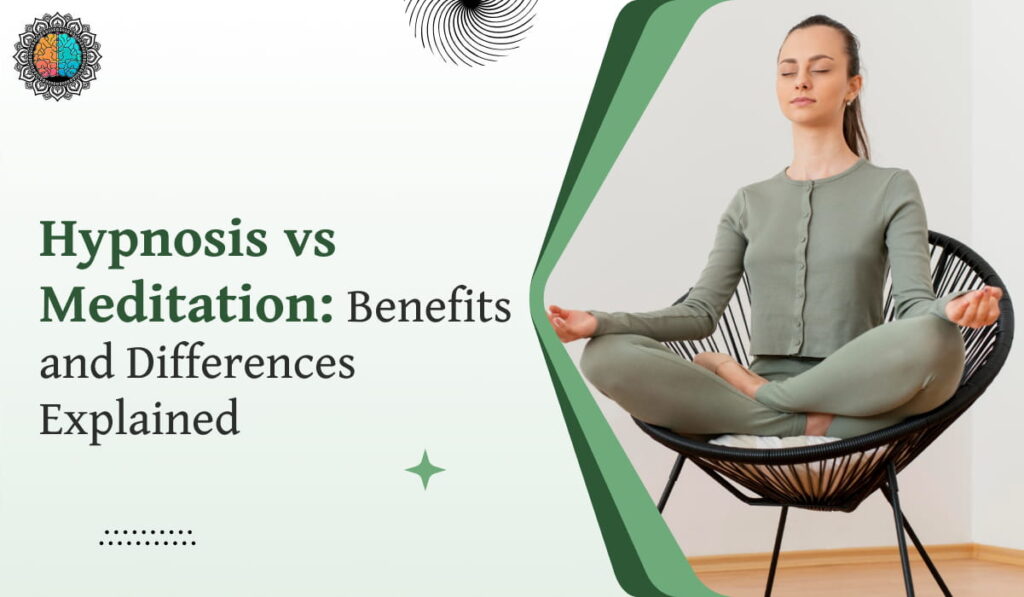
Hypnosis and meditation, once seen as unconventional practices, are now widely embraced for their ability to foster harmony and peace. As non-medical approaches to well-being, they are increasingly valued by people seeking balance in their lives and gaining recognition within the medical community for their powerful therapeutic benefits.
Meditation and hypnotherapy both can have significant effects on your general well-being, mental health, and quality of life.
Many people assume hypnosis and meditation are the same, but they’re quite different. Each has unique approaches and benefits—so what sets them apart, and how can you decide which one is best for you?
Let’s hear it from the certified hypnotherapist herself. In this blog, I will help cover everything you need to know about it. So, let’s get started.
Meditation has been used for millennia to help people find inner calm, mental clarity, and spiritual upliftment. Meditation is a practice that involves training the mind to focus, redirect thoughts, or reach a state of heightened awareness. At its core, meditation encourages a state of deep relaxation and presence, allowing individuals to observe thoughts and feelings without attachment or judgment. This enables you to discover serenity and calm amidst the stress of your daily life.
There are several different styles of meditation that you should be aware of:
These meditation styles for self-improvement cater to different needs—whether it’s reducing stress, developing compassion, or deepening awareness. You can choose any one or more than one based on what you want.
Through hypnosis, you can alter your emotions, habits, and actions. If you have a goal in your conscious mind but are having trouble reaching it, it may indicate that something is preventing you from moving forward in your subconscious.
While guided meditation and hypnosis are comparable, a hypnotherapist’s guided imagery will be highly personalized and tailored to your needs. Together, you and your hypnotist will clarify your objectives and identify any subconscious programming—typically from early life or prior experiences—that might be causing roadblocks or difficulties.
Each hypnotherapy session gently peels back the “layers of the onion,” allowing you to heal and uncover deeper aspects of yourself.
Meditation is a practice of self-improvement and mental well-being embraced for its own sake, without focusing on specific outcomes. Its purpose is to foster awareness, inner peace, and being present in the moment, rather than to solve specific issues like weight loss or stress.
On the other hand, hypnosis is typically used for therapeutic purposes. As a result, sessions become more focused and centered on a single issue. For instance, the goals of hypnotherapy sessions include reducing anxiety, resolving marital issues, helping people lose weight, accepting their phobias, relieving chronic pain, or recovering from burnout.
Meditation is often described as a passive process encouraging individuals to observe their thoughts and feelings without judgment or attachment. This non-involvement is essential to cultivating a state of mindfulness, where one can experience the present moment fully. It involves sitting in silence, focusing on the breath, and practicing mindfulness.
In contrast, hypnosis takes a more active approach. It involves guiding the mind to engage with specific memories, visualize detailed scenarios, or explore deeply held beliefs.
Rather than passively witnessing thoughts, hypnotherapy encourages focused mental participation. For instance, during a hypnotherapy session, a person might revisit the past, access emotions tied to certain experiences, or imagine positive outcomes that reshape their thinking patterns. This process actively directs the mind toward discovery, change, and healing.
Hypnotherapy benefits aims for change. It addresses specific challenges, helping clients shift their thoughts and behaviors for better outcomes. Be it weight loss, stopping smoking, tackling relationship problems, guided hypnosis for relaxation, or whatnot – each session is structured to create tangible results.
Meditation, on the other hand, focuses on spiritual upliftment and a connection with broader consciousness through the establishment of inner peace and acceptance. It is helpful for calming the mind and reducing stress, but it doesn’t target specific problems. Instead, it fosters a general sense of well-being and mindfulness.
Hypnosis taps into the subconscious, where memories, emotions, and habits are stored. It helps uncover deep-rooted patterns and beliefs that influence behavior. For example, someone struggling with self-doubt might find that the issue stems from an experience. Once identified, the hypnotherapist helps reframe these beliefs, creating lasting change by addressing the root cause instead of just the symptoms.
Meditation focuses on being present, encouraging awareness of what’s happening now—like the breath, body sensations, or sounds. It doesn’t try to change thoughts or emotions but teaches acceptance without judgment. For example, when you experience stress, meditation helps individuals notice it calmly, reducing stress over time by responding with awareness instead of reacting impulsively.
Meditation and hypnosis are both effective ways to relax and relieve tension. Nonetheless, they are two separate practices with different goals and approaches. We have listed the basics and differences between hypnosis and meditation followed by how it works – you just have to make the right choice.
If you would like to try meditation – then it is a great practice and might help you achieve peace, calmness, and mindfulness in your life might even get the results you want.
And, if you think you can’t be able to do this alone and would like to get a help from professional, or maybe you are trying to solve a particular problem – hypnotherapy is your solution.
If you are looking for a leading certified hypnotherapist in California – I can help you out. I’m a certified hypnotherapist in California and have been helping clients with their specific problems with personalized hypnotherapy sessions.
Jigeesha Pandya is a Certified Hypnotherapist and Reiki Practitioner. With a background in climate change research, she shifted her focus to hypnotherapy, studying at the renowned Hypnosis and Motivation Institute in Los Angeles. Jigeesha is passionate about helping individuals harness the power of the subconscious mind for healing and growth.
